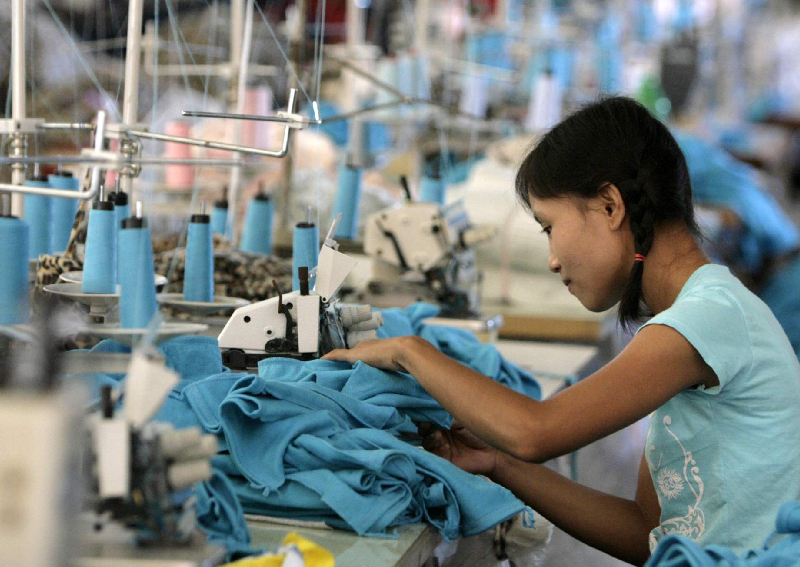Fashion brands from Zara to H&M urged to make ‘responsible exit’ from Myanmar, Asia News
International vogue brands are failing to secure garment personnel in Myanmar’s offer chains, with labour and human rights violations surging across the region because the army coup in February past 12 months, in accordance to a new report.
The Business enterprise & Human Legal rights Useful resource Centre, an global NGO that tracks the human legal rights impacts of organizations, on Tuesday unveiled a review that discovered “popular and systemic abuse in international brands’ supply chains”. This bundled wage theft, abusive do the job prices, obligatory unpaid overtime, as properly as gender-based violence and sexual harassment.
The non-profit group, together with associates, compiled 104 situations of labour and human rights violations from at the very least 60,800 staff in Myanmar’s garment sector from Feb 1 very last calendar year to date, primarily based on publicly recorded details.
In accordance to the report, the employees involved were employed at 70 factories that provide, or have a short while ago provided, to at the very least 32 worldwide trend models and stores, which includes Adidas, Inditex (Zara and Bershka), Speedy Retailing (Uniqlo), multinational manner retailer Hennes & Mauritz (H&M ), and Primark.
“Models need to wake up to the severe actuality that good operating conditions no for a longer time exist in Myanmar and continuing business as typical is no for a longer time helping to ‘protect careers and staff, as has been repeatedly claimed,” reported Alysha Khambay, head of labour rights at the Small business & Human Rights Source Centre.
“When the armed forces is not conducting doorway-to-door searches in hostels and houses, their presence is getting requested by factories to threaten personnel into silence,” she mentioned.
Scientists explained that the info highlighted not only the scale and scope of abuse in the 18 months due to the fact the armed forces seized ability, but also the “common impunity” loved by perpetrators.
Between the most popular violations ended up wage theft (55 situations) as effectively as abusive work costs and mandatory additional time (35 scenarios), along with 31 circumstances of attacks on flexibility of affiliation.
The tracker also documented the killing of seven employees by the army and armed protection forces, with 15 circumstances of arbitrary arrest and detention of staff.
Khambay said that each individual circumstance recorded on the database included an allegation or multiple allegations that affected employees used at a factory. Some circumstances may be related to only 1 worker, although many others impacted thousands.

“We know how several distinct incidents of abuse there has been, but we really don’t constantly know the specific variety of employees it has influenced,” she pointed out. “This implies that the actual overall amount of influenced personnel could be a great deal bigger than 60,800.”
Khambay stated the cases that have been documented were “just the tip of the iceberg offered the intense limits on civic freedoms and reporting beneath military rule, and the heightened threat of reprisals for employees who communicate out versus abuse”.
Violence towards ladies
Myanmar’s garment personnel – numbering about 700,000, of whom 90 per cent are women of all ages – have been on the frontline of the country’s civil disobedience motion towards the navy.
Researchers claimed they have confronted increasing degrees of gender-centered violence and harassment beneath the regime.
The report outlined 28 precise scenarios of alleged gender-based violence, which included sexual harassment, physical, and verbal abuse of gals staff. But most of the other conditions constituted some form of gender-primarily based violence, according to the United Nations pointers.
The review explained scenarios in which manufacturing unit professionals and supervisors had been subjecting ladies employees to staying punched in the chest and head, getting kicked, yelled at, and referred to as “canines”. Personnel also explained they ended up routinely needed to do extreme several hours, often right up until midnight, with some factories not furnishing transport household, which has allegedly led to the rape of at least one woman.
Researchers mentioned that numerous abuse allegations had been perpetrated straight by the brand’s manufacturing facility suppliers or by the navy in collusion with those suppliers.
Amid people linked to the most abuse allegations were being common brand names and retailers, this sort of as Zara and Bershka of the Inditex team (nine allegations), Bestseller (nine allegations), Lidl (eight allegations), and H&M (6 allegations).

The Enterprise & Human Rights Useful resource Centre gave the 32 consumers connected to the factories the opportunity to respond to the alleged abuse of personnel in their provide chains. About two-thirds responded.
Addressing worries raised in the report, a spokesman for the Spanish fashion retailer Inditex advised scientists that the enterprise has monitored the issue. “We are working carefully with our suppliers and major companions”, the assertion examine, introducing that the “fair treatment method of personnel and no discrimination versus its reps” have been priorities.
Swedish fast trend H&M Team also stated it “remained deeply worried about the problem in Myanmar and is consistently conducting extensive due diligence”, although building guaranteed that “violations are determined and properly remedied”.
The corporation additional it was “mindful of increased troubles in relation to elementary human rights” and that considerations had been elevated “with suppliers as effectively as trade unions”.
Denmark-based mostly manner business Bestseller instructed scientists that it experienced increased due diligence and set a lot more assets into assuring that workers’ rights have been respected because the coup took area.
“There is no straightforward ethical resolution to sourcing in Myanmar and the gravity of this dilemma underlies our obligation to await the independent affect assessment,” a statement go through. Bestseller’s potential in Myanmar would be determined in “dialogue with professionals, NGOs, trade unions and other related stakeholders”.
Retailer chain Lidl explained that it took “accusations incredibly significantly”, referring to instances that provided threats in opposition to union leaders, dangerous doing the job situations, and discrimination from expecting employees.
“[We] right away initiated our compliance approach and communicated all mentioned compliance scenarios to our provider who is investigating these. Until the remediation is finish, no new orders will be placed at the manufacturing facility,” reported a assertion from Lidl.
Gains around human rights
Khambay claimed factories have taken gain of the dictatorship to roll back again the hard-gained labour rights, which unions experienced fought for more than the earlier two a long time.
“With independence of association curtailed to around non-existence, brands do not have distinct oversight around their offer chains or the dangers and abuse struggling with the employees … it is pretty much impossible to carry out any successful human rights owing diligence in the country,” Khambay mentioned.
[[nid:521368]]
Even with phone calls for worldwide manufacturers to withdraw from Myanmar until finally democracy is restored, the research said that only two providers – Tesco and Aldi South – have exited.
“The many remaining manufacturers need to answer accusations they stand to income from the repression of their largely feminine garment workforce under armed service rule,” the report study.
Researchers reported that even though brand names these kinds of as Primark and H&M to begin with suspended orders next the armed service takeover, they have given that resumed, citing the defense of work opportunities as a important aspect in this selection.
“Nevertheless, at the onset of the Covid-19 pandemic, some of these identical brand names – and quite a few other individuals sourcing from Myanmar – cancelled orders and asked for retroactive discounts with little thought for the employees in their source chain, who have been dismissed in their thousands devoid of payment of owed wages,” the report study.
Right before the army takeover, garment employees could assume to make some US$3.50 ($4.85) a day but beneath the existing regime, workers mentioned that numerous factories experienced lower wages when driving them to fulfill improved production targets. A lot of now make significantly less than US$2 a day.
Though some groups and makes, these as Inditex and Mango, described that they had reduce ties with factories exactly where the abuse took location, advocates said that such effort and hard work had fallen brief.
Khambay reported that world-wide models will have to use their leverage to present the dictatorship that this abuse will not be tolerated, or danger being implicated in the ongoing suffering of personnel.
“If manufacturers can’t assure the security of workers’ rights in their source chains, a responsible exit from the state is the only way ahead,” she explained.
This post was very first printed in South China Early morning Post.
